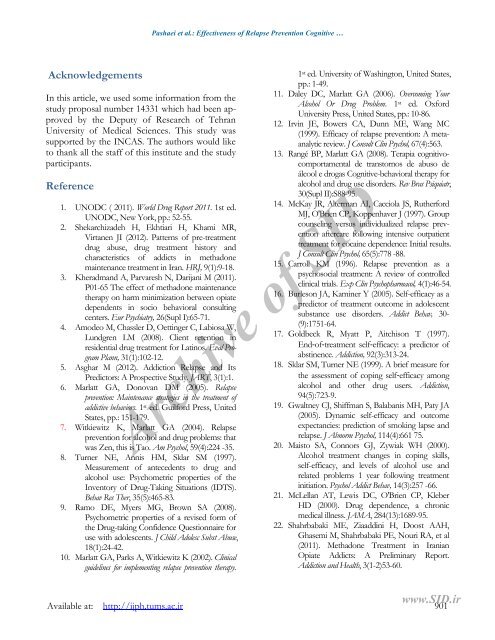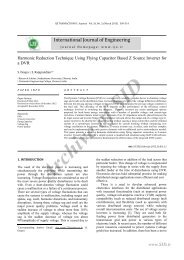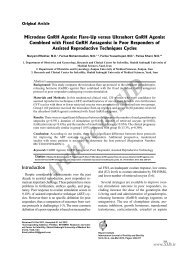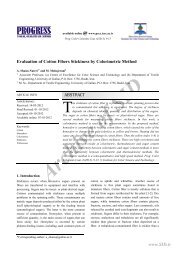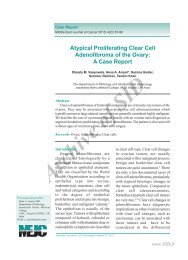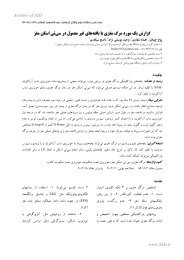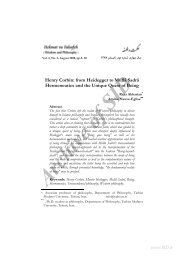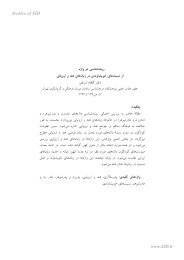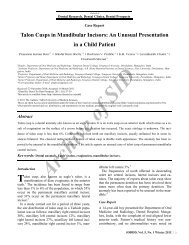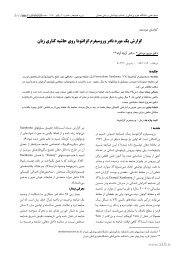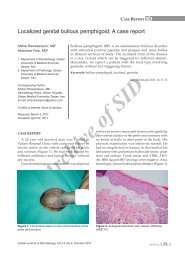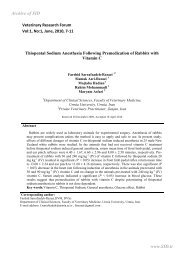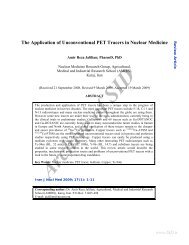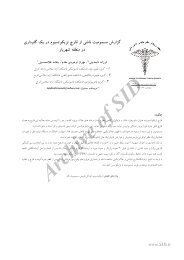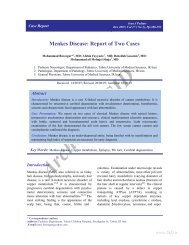effectiveness of relapse prevention cognitive- behavioral model ... - Sid
effectiveness of relapse prevention cognitive- behavioral model ... - Sid
effectiveness of relapse prevention cognitive- behavioral model ... - Sid
Create successful ePaper yourself
Turn your PDF publications into a flip-book with our unique Google optimized e-Paper software.
Pashaei et al.: Effectiveness <strong>of</strong> Relapse Prevention Cognitive …<br />
Acknowledgements<br />
In this article, we used some information from the<br />
study proposal number 14331 which had been approved<br />
by the Deputy <strong>of</strong> Research <strong>of</strong> Tehran<br />
University <strong>of</strong> Medical Sciences. This study was<br />
supported by the INCAS. The authors would like<br />
to thank all the staff <strong>of</strong> this institute and the study<br />
participants.<br />
Reference<br />
1. UNODC ( 2011). World Drug Report 2011. 1st ed.<br />
UNODC, New York, pp.: 52-55.<br />
2. Shekarchizadeh H, Ekhtiari H, Khami MR,<br />
Virtanen JI (2012). Patterns <strong>of</strong> pre-treatment<br />
drug abuse, drug treatment history and<br />
characteristics <strong>of</strong> addicts in methadone<br />
maintenance treatment in Iran. HRJ, 9(1):9-18.<br />
3. Kheradmand A, Parvaresh N, Darijani M (2011).<br />
P01-65 The effect <strong>of</strong> methadone maintenance<br />
therapy on harm minimization between opiate<br />
dependents in socio <strong>behavioral</strong> consulting<br />
centers. Eur Psychiatry, 26(Supl I):65-71.<br />
4. Amodeo M, Chassler D, Oettinger C, Labiosa W,<br />
Lundgren LM (2008). Client retention in<br />
residential drug treatment for Latinos. Eval Program<br />
Plann, 31(1):102-12.<br />
5. Asghar M (2012). Addiction Relapse and Its<br />
Predictors: A Prospective Study. JART, 3(1):1.<br />
6. Marlatt GA, Donovan DM (2005). Relapse<br />
<strong>prevention</strong>: Maintenance strategies in the treatment <strong>of</strong><br />
addictive behaviors. 1 st ed. Guilford Press, United<br />
States, pp.: 151-179.<br />
7. Witkiewitz K, Marlatt GA (2004). Relapse<br />
<strong>prevention</strong> for alcohol and drug problems: that<br />
was Zen, this is Tao. Am Psychol, 59(4):224 -35.<br />
8. Turner NE, Annis HM, Sklar SM (1997).<br />
Measurement <strong>of</strong> antecedents to drug and<br />
alcohol use: Psychometric properties <strong>of</strong> the<br />
Inventory <strong>of</strong> Drug-Taking Situations (IDTS).<br />
Behav Res Ther, 35(5):465-83.<br />
9. Ramo DE, Myers MG, Brown SA (2008).<br />
Psychometric properties <strong>of</strong> a revised form <strong>of</strong><br />
the Drug-taking Confidence Questionnaire for<br />
use with adolescents. J Child Adolesc Subst Abuse,<br />
18(1):24-42.<br />
10. Marlatt GA, Parks A, Witkiewitz K (2002). Clinical<br />
guidelines for implementing <strong>relapse</strong> <strong>prevention</strong> therapy.<br />
1 st ed. University <strong>of</strong> Washington, United States,<br />
pp.: 1-49.<br />
11. Daley DC, Marlatt GA (2006). Overcoming Your<br />
Alcohol Or Drug Problem. 1 st ed. Oxford<br />
University Press, United States, pp.: 10-86.<br />
12. Irvin JE, Bowers CA, Dunn ME, Wang MC<br />
(1999). Efficacy <strong>of</strong> <strong>relapse</strong> <strong>prevention</strong>: A metaanalytic<br />
review. J Consult Clin Psychol, 67(4):563.<br />
13. Rangé BP, Marlatt GA (2008). Terapia cognitivocomportamental<br />
de transtornos de abuso de<br />
álcool e drogas Cognitive-<strong>behavioral</strong> therapy for<br />
alcohol and drug use disorders. Rev Bras Psiquiatr,<br />
30(Supl II):S88-95.<br />
14. McKay JR, Alterman AI, Cacciola JS, Rutherford<br />
MJ, O'Brien CP, Koppenhaver J (1997). Group<br />
counseling versus individualized <strong>relapse</strong> <strong>prevention</strong><br />
aftercare following intensive outpatient<br />
treatment for cocaine dependence: Initial results.<br />
J Consult Clin Psychol, 65(5):778 -88.<br />
15. Carroll KM (1996). Relapse <strong>prevention</strong> as a<br />
psychosocial treatment: A review <strong>of</strong> controlled<br />
clinical trials. Exp Clin Psychopharmacol, 4(1):46-54.<br />
16. Burleson JA, Kaminer Y (2005). Self-efficacy as a<br />
predictor <strong>of</strong> treatment outcome in adolescent<br />
substance use disorders. Addict Behav, 30-<br />
(9):1751-64.<br />
17. Goldbeck R, Myatt P, Aitchison T (1997).<br />
End‐<strong>of</strong>‐treatment self‐efficacy: a predictor <strong>of</strong><br />
abstinence. Addiction, 92(3):313-24.<br />
18. Sklar SM, Turner NE (1999). A brief measure for<br />
the assessment <strong>of</strong> coping self‐efficacy among<br />
alcohol and other drug users. Addiction,<br />
94(5):723-9.<br />
19. Gwaltney CJ, Shiffman S, Balabanis MH, Paty JA<br />
(2005). Dynamic self-efficacy and outcome<br />
expectancies: prediction <strong>of</strong> smoking lapse and<br />
<strong>relapse</strong>. J Abnorm Psychol, 114(4):661 75.<br />
20. Maisto SA, Connors GJ, Zywiak WH (2000).<br />
Alcohol treatment changes in coping skills,<br />
self-efficacy, and levels <strong>of</strong> alcohol use and<br />
related problems 1 year following treatment<br />
initiation. Psychol Addict Behav, 14(3):257 -66.<br />
21. McLellan AT, Lewis DC, O'Brien CP, Kleber<br />
HD (2000). Drug dependence, a chronic<br />
medical illness. JAMA, 284(13):1689-95.<br />
22. Shahrbabaki ME, Ziaaddini H, Doost AAH,<br />
Ghasemi M, Shahrbabaki PE, Nouri RA, et al<br />
(2011). Methadone Treatment in Iranian<br />
Opiate Addicts: A Preliminary Report.<br />
Addiction and Health, 3(1-2)53-60.<br />
Archive <strong>of</strong> SID<br />
www.SID.ir<br />
Available at: http://ijph.tums.ac.ir 901


